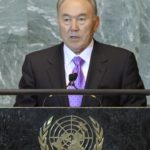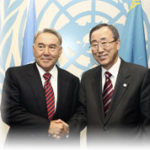 Over the past twenty-three years the Republic of Kazakhstan has carried out reforms virtually in all areas of public and social life. As a homeland to over 130 different nationalities and ethnic groups, special attention has been paid to the consolidation of the sentiment of national statehood, the development of relevant laws, the establishment of an effective and transparent mechanism for the development of the individual and society, and improving the population’s standard of living.
Over the past twenty-three years the Republic of Kazakhstan has carried out reforms virtually in all areas of public and social life. As a homeland to over 130 different nationalities and ethnic groups, special attention has been paid to the consolidation of the sentiment of national statehood, the development of relevant laws, the establishment of an effective and transparent mechanism for the development of the individual and society, and improving the population’s standard of living.
The Constitution of the Republic of Kazakhstan includes all the guarantees needed for the promotion of constitutional legality and the further strengthening of the existing pillars of a democratic, secular, law-abiding and socialist state. It has become a real tool for the achievement of the constitutional imperative of the highest order. The country adheres to the principle of the universality of human rights, as enshrined in the Universal Declaration of Human Rights, which includes internationally recognized standards in this domain, so that they shall guide the state when implementing them on the domestic level.
Kazakhstan has signed more than 190 universal international treaties and conventions, primarily in the area of human rights. There is an ongoing process of innovatory mechanisms that will ensure public participation in the implementation and exercise of state power, and the involvement of citizens in state governance. Thanks to the strengthening of the legal framework for the organization and functioning of political parties, as well as in the non-governmental sector, and the establishment, under government agencies, of advisory and deliberative bodies, Kazakhstan has been able to pursue gradual devolution of socially important sectors and functions of local governance to civil society.
 Kazakhstan fully supports the work of the United Nations Human Rights Council and has been an active member since 2013. The country is involved with human rights mechanisms, first of all concerning one of the key mechanisms of the Council ‒‒ the Universal Periodic Review (UPR). On 30 October 2014 Kazakhstan completed its second UPR exercise, which resulted in its acceptance of 143 recommendations out of 194. Currently, Kazakhstan is working on the implementation of the National Action Plan to implement the UPR recommendations for the period 2015‒2020.
Kazakhstan fully supports the work of the United Nations Human Rights Council and has been an active member since 2013. The country is involved with human rights mechanisms, first of all concerning one of the key mechanisms of the Council ‒‒ the Universal Periodic Review (UPR). On 30 October 2014 Kazakhstan completed its second UPR exercise, which resulted in its acceptance of 143 recommendations out of 194. Currently, Kazakhstan is working on the implementation of the National Action Plan to implement the UPR recommendations for the period 2015‒2020.
As a full member of the UN Human Rights Council for 2013‒2015, Kazakhstan participates actively in all of its activities. During 2014 the Permanent Mission of Kazakhstan to the United Nations Organization in Geneva has been responsible for coordinating the work of the Asia-Pacific Group on the Council. The Permanent Representative, Ambassador Mukhtar Tileuberdi, was elected as Chairman of the fifth Meeting of the State Parties to the Optional Protocol to the Convention against Torture which was held on 23 October 2014 in Geneva.
Kazakhstan submits periodic national reports in accordance with seven United Nations conventions defining basic rights and freedoms. In 2014 Kazakhstan successfully defended its combined sixth and seventh reports on the implementation of the International Convention on the Elimination of All Forms of Racial Discrimination, the combined third and fourth reports on the Convention on the Elimination of All Forms of Discrimination against Women, and the third report on the Convention against Torture and Other Cruel, Inhuman or Degrading Treatment or Punishment (1984).
Kazakhstan is working closely with the special procedures of the Council. It has sent a standing invitation to all mandate holders, which clearly demonstrates the openness of the country. In addition, Kazakhstan is one of the few countries that have organized follow-up visits by the Special Rapporteurs. The special procedures of the Human Rights Council are independent human rights experts with mandates to report and advise on human rights from a thematic or country-specific perspective. Special procedures report annually to the Human Rights Council; the majority of the mandates also report to the General Assembly.
As of today, eight Special Rapporteurs have visited Kazakhstan. Following the visits of these Special Rapporteurs, Kazakhstan developed and implemented action plans to follow up on their recommendations. Two more visits – Special Rapporteur on the right to freedom of peaceful assembly and association, Special Rapporteur on the implications for human rights of the environmentally sound management and disposal of hazardous substances and wastes, and members of the Working Group on the issue of human rights and transnational corporations and other business enterprises are expected in 2015.
The acceptance by Kazakhstan of the competence of four out of eight United Nations Committees to receive individual complaints of citizens about human rights violations represents an effective mechanism to ensure compliance with human rights standards in the country. Kazakhstan is a founding member of the International Commission against the Death Penalty and implements the Commission’s policy of its gradual abolition. The country has an indefinite moratorium on the death penalty, and has implemented life imprisonment as an alternative.
Kazakhstan is committed to the fundamental principles of international law, among which the respect of human rights and freedom, impartiality and non-politicization are deemed pivotal for a sustainable, universal and effective global architecture for protecting human rights.
Kazakhstan, as a multi-national and multi-confessional country, facilitates a comprehensive dialogue between civilizations within the United Nations, as well as among various international and regional organizations. The Congress of Leaders of World and Traditional Religions, which Kazakhstan convenes every three years, contributes to global and regional security, by garnering the spiritual and moral potential of world religions to regulate international conflicts, and to prevent confrontation between confessions and cultures. Upon the initiative of Kazakhstan, the United Nations General Assembly proclaimed 2013‒2022 as the International Decade for the Rapprochement of Cultures.
 The Republic of Kazakhstan is a champion for the rule of law, both at the national and international levels. It has consistently called for strict compliance with universally accepted legal norms by all members of the international community.
The Republic of Kazakhstan is a champion for the rule of law, both at the national and international levels. It has consistently called for strict compliance with universally accepted legal norms by all members of the international community.
In continuation of its international activities, Kazakhstan has announced its bid for a non-permanent membership on the United Nations Security Council for 2017‒2018 years. Its bid is based on four central pillars: food security, water security, energy security and nuclear security.
Kazakhstan is fully committed to international peace and security and attaches special significance to the issues of compliance with and respect for fundamental human rights and freedoms. Its active and measured involvement in a significant number of regional and global processes has given Kazakhstan wide-ranging experience and equipped it to address many of the challenges facing the world today.
As a regional leader and global partner in matters of energy security, and a valued contributor to international peace-keeping missions, Kazakhstan wishes to bring its unique experience and expertise to bear on some of the pressing challenges.
As of today, eight Special Rapporteurs have visited Kazakhstan. Following the visits of these Special Rapporteurs, Kazakhstan developed and implemented action plans to follow up on their recommendations. Two more visits – Special Rapporteur on the right to freedom of peaceful assembly and association, Special Rapporteur on the implications for human rights of the environmentally sound management and disposal of hazardous substances and wastes, and members of the Working Group on the issue of human rights and transnational corporations and other business enterprises are expected in 2015.
The acceptance by Kazakhstan of the competence of four out of eight United Nations Committees to receive individual complaints of citizens about human rights violations represents an effective mechanism to ensure compliance with human rights standards in the country. Kazakhstan is a founding member of the International Commission against the Death Penalty and implements the Commission’s policy of its gradual abolition. The country has an indefinite moratorium on the death penalty, and has implemented life imprisonment as an alternative.
Kazakhstan is committed to the fundamental principles of international law, among which the respect of human rights and freedom, impartiality and non-politicization are deemed pivotal for a sustainable, universal and effective global architecture for protecting human rights.
Kazakhstan, as a multi-national and multi-confessional country, facilitates a comprehensive dialogue between civilizations within the United Nations, as well as among various international and regional organizations. The Congress of Leaders of World and Traditional Religions, which Kazakhstan convenes every three years, contributes to global and regional security, by garnering the spiritual and moral potential of world religions to regulate international conflicts, and to prevent confrontation between confessions and cultures. Upon the initiative of Kazakhstan, the United Nations General Assembly proclaimed 2013‒2022 as the International Decade for the Rapprochement of Cultures.
The Republic of Kazakhstan is a champion for the rule of law, both at the national and international levels. It has consistently called for strict compliance with universally accepted legal norms by all members of the international community.
In continuation of its international activities, Kazakhstan has announced its bid for a non-permanent membership on the United Nations Security Council for 2017‒2018 years. Its bid is based on four central pillars: food security, water security, energy security and nuclear security.
Kazakhstan is fully committed to international peace and security and attaches special significance to the issues of compliance with and respect for fundamental human rights and freedoms. Its active and measured involvement in a significant number of regional and global processes has given Kazakhstan wide-ranging experience and equipped it to address many of the challenges facing the world today.
As a regional leader and global partner in matters of energy security , and a valued contributor to international peace-keeping missions, Kazakhstan wishes to bring its unique experience and expertise to bear on some of the pressing challenges.





